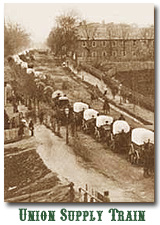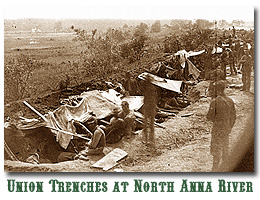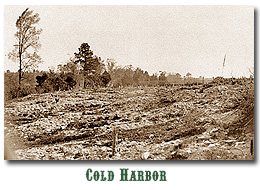Life
on Campaign
 he life of the Civil War soldier has been
described as being characterized by long months of boring fatigue
duties, strict discipline in the ranks, and frequent repetitive
drilling, interspersed with brief interludes of terrifying, immensely
bloody encounters with the enemy.
he life of the Civil War soldier has been
described as being characterized by long months of boring fatigue
duties, strict discipline in the ranks, and frequent repetitive
drilling, interspersed with brief interludes of terrifying, immensely
bloody encounters with the enemy.
Yet for even the most seasoned veterans, the
month-and-a-half-long Overland Campaign of late spring 1864 was unusual
in both duration and intensity. For weeks on end, the Army of the
Potomac was run ragged by almost nightly marches and exhausting fatigue
duty - troops building earthworks and destroying rail lines - all the
while exposed to constant sniping from and frequent battles with
Confederate forces.
 Hardships were many and compounded by a
lack of adequate supplies. For much of the fast- moving campaign, the
Union army's horse-drawn wagon trains struggled to keep up with the
advancing troops. As often as not, they fell into the hands of the
rebels or got lost on the back-country roads of Virginia.
Hardships were many and compounded by a
lack of adequate supplies. For much of the fast- moving campaign, the
Union army's horse-drawn wagon trains struggled to keep up with the
advancing troops. As often as not, they fell into the hands of the
rebels or got lost on the back-country roads of Virginia.
The Overland Campaign was a grueling
struggle even for battle-tested veteran regiments like the 28th
Massachusetts, with heavy casualties taking an enormous toll. Departing
for the front on May 3, 1864, with 505 men of all ranks, the
hard-fighting Irishmen of the 28th would lose 286 men killed, wounded,
and missing, or nearly 60 percent, by June 15. Most of these losses
(225) came in the first three weeks of May at the Wilderness and
Spotsylvania.
One can only marvel at the stubborn
determination and amazing esprit de corps these men continued to show
in the face of grievous losses; many of their dear comrades long since
gone, replaced by a mixed collection of late-war volunteers and
conscripts. Capt. James Fleming was of the opinion that "great credit
is due both the officers and men in this regiment for the energy
displayed, bravery and labor obtained from them under great fatigue and
difficulties."
The excerpts that follow are taken from the
reports of Capt. Fleming, then commanding the 28th Massachusetts in the
absence of any higher officer, and describe the activities and
whereabouts of the regiment during the Overland Campaign. They are
directly quoted from the Official Records (Series I, Volume 36, Chapter
48), with spelling and punctuation as in the original.
Skirmishers
in the Battle of the Wilderness, May 4-9, 1864
"The Twenty-eighth Massachusetts Volunteer
Regiment broke camp at Stevensburg, Va., at dark on the evening of May
3, 1864, and marched at night, under the command of Lieut. Col. George
W. Cartwright, with 485 enlisted men, 2 field officers, and 18 line
officers, in company with the Sixty-third, Sixty-ninth, Eighty-eighth
New York Volunteers, and the One hundred and sixteenth Pennsylvania
Volunteers, composing the Second Brigade of the First Division, Second
Army Corps, the brigade being commanded by Col. Thomas A. Smyth, First
Delaware Volunteers, the division by Brig. General (Francis) Barlow,
and the corps by Maj. Gen. W.S. Hancock. Crossed the Rapidan near
daylight at Ely's Ford on pontoon, and reached Chancellorsville at
about 3 p.m. May 4, 1864. Bivouacked that night on the old
Chancellorsville battleground. From thence at daylight on the morning
of May 5, 1864, marched again, this regiment deployed on the left flank
of the column as flankers.  In the afternoon marched to the
right of
Todd's Tavern, crossing the plank road, and went into the battle of the
Wilderness. This regiment being the only one in the Second Brigade who
were armed with rifles, it was constantly acting as skirmishers, while
the brigade was at work throwing up their intrenchments of logs and
earth. Were engaged again on the 6th, 7th, and 8th of May, suffering
much in loss of officers and men, fatigue, etc.
In the afternoon marched to the
right of
Todd's Tavern, crossing the plank road, and went into the battle of the
Wilderness. This regiment being the only one in the Second Brigade who
were armed with rifles, it was constantly acting as skirmishers, while
the brigade was at work throwing up their intrenchments of logs and
earth. Were engaged again on the 6th, 7th, and 8th of May, suffering
much in loss of officers and men, fatigue, etc.
The regiment performed the duties assigned
them in a very creditable manner, although laboring under formidable
disadvantages. In this epoch he regiment lost in killed, wounded, and
missing as follows: Killed, 2 commissioned officers, 18 enlisted men;
wounded, 3 commissioned officers, 85 enlisted men; missing, 18 enlisted
men. Left Wilderness night of May 8, 1864."
Charge and Other Actions at the River Po,
May 9-22, 1864
"Marched nights of May 8, 9, and 10, and
skirmishing most of the time. Engaged at River Po and vicinity,
changing front several times under enemy's artillery fire; threw up
intrenchments and supported a regular battery; fell back across Po
River; sent out scouting parties; destroyed small bridges, etc. On the
night of May 11, 1864, we marched several miles, passing through the
camp of the Sixth Army Corps, and pushed forward until about 1 or 2
o'clock on the morning of May 12, 1864. Here we massed the Second
Corps, the First and Third Divisions in advance, and balance of corps
in reserve. At daylight May 12, made the great charge on the enemy's
position, and assisted in carrying their works, capturing artillery and
many prisoners, 1 general officer being captured in his tent by a
private in this regiment.
The regiment in this engagement suffered
much, but acted with their usual bravery and spirit, losing from May 9
to May 12: enlisted men, 4 killed, 5 wounded and 1 missing. In the
charge May 12, 1864, we lost as follows: enlisted men: killed 10,
wounded 39, and 4 missing, 1 officer wounded. From the 12th of May
until the night of the 17th of May the regiment was either skirmishing,
fighting, or changing position almost constantly. On the night of May
17 we again formed en masse, and early on the morning of May 18, 1864,
again charged the enemy's intrenched position near Spotsylvania
Court-House. In the charge, the regiment held the left of the enemy's
line, which was taken, but again suffered greatly, especially among its
gallant officers.
Here fell the brave Maj. Andrew J. Lawler,
commanding the regiment, the accomplished Capt. James Magner, the
lamented Capt. William F. Cochrane, all killed; also Capt. Covenay,
Capt. Fleming, Capt. Bailey, Lt. Armand, wounded. Casualties may 18:
killed, 3 officers, 8 men; wounded, 4 officers, 25 enlisted men; and 16
missing. The regiment held the left of the enemy's line all day,
exposed to an enfilading fire of grape and canister from enemy's
battery, and were relieved at 5 p.m., losing many of its best officers
and soldiers.
The casualties of this (second) epoch as
follows: 3 officers and 22 enlisted men killed, 5 officers and 71
enlisted men wounded, 20 enlisted men missing, and 1 prisoner."
Fighting
and Exhaustion Near North Anna River, May 23-27, 1864
 "Moved from the vicinity of Spotsylvania
Court-House May 22, 1864; had a long, weary, dusty march, the men
suffering greatly for water, which was very scarce, and the roads were
very heavy with dust. Tuesday, May 24, crossed the North Anna River.
Heavy artillery firing commenced. The enemy falls back. Our regiment
lay all day in open field, exposed to the blistering sun without
shelter.Third Division storm enemy's work, and meet with success, but
lost heavily; made heavy detail for picket duty and lost 2 men.
Wednesday, May 25, regiment lay on their arms all night in a drenching
rain. The men suffered much, having had no rest for past three days,
and their rations having run short, long marches, constant duty, etc.;
the officers sharing alike with them in the fatigue, exposure, and
short rations. Enemy fell back from our immediate front during last
night; fresh beef issued very often. The Ninth Corps, on our right, are
at work all day with heavy Parrotts. Enemy in full sight, throwing up
earthworks. Bivouacked in open field all night. Thursday, May 26, to
arms at 3:30 a.m. Men still short of rations; principle cause, extra
duty, and labor, etc.; 2:30 p.m., still lay in reserve. Trains and
cattle which had crossed to south side are recrossed, and we are
prepared to fall back. Supply train arrives, and rations are issued to
men and officers at 8 p.m. At 10 p.m. we fall back and recross the
North Anna.
"Moved from the vicinity of Spotsylvania
Court-House May 22, 1864; had a long, weary, dusty march, the men
suffering greatly for water, which was very scarce, and the roads were
very heavy with dust. Tuesday, May 24, crossed the North Anna River.
Heavy artillery firing commenced. The enemy falls back. Our regiment
lay all day in open field, exposed to the blistering sun without
shelter.Third Division storm enemy's work, and meet with success, but
lost heavily; made heavy detail for picket duty and lost 2 men.
Wednesday, May 25, regiment lay on their arms all night in a drenching
rain. The men suffered much, having had no rest for past three days,
and their rations having run short, long marches, constant duty, etc.;
the officers sharing alike with them in the fatigue, exposure, and
short rations. Enemy fell back from our immediate front during last
night; fresh beef issued very often. The Ninth Corps, on our right, are
at work all day with heavy Parrotts. Enemy in full sight, throwing up
earthworks. Bivouacked in open field all night. Thursday, May 26, to
arms at 3:30 a.m. Men still short of rations; principle cause, extra
duty, and labor, etc.; 2:30 p.m., still lay in reserve. Trains and
cattle which had crossed to south side are recrossed, and we are
prepared to fall back. Supply train arrives, and rations are issued to
men and officers at 8 p.m. At 10 p.m. we fall back and recross the
North Anna.
Casualties in this epoch (third) as follows:
2 enlisted men killed, 8 enlisted men wounded, and 1 enlisted man
missing. Closed this epoch tearing up rails and destroying railroad."
Continual
Fighting Near Gaines Mill, May 28-June 3, 1864
"Bivouacked night of May 27 in the mud from
1 a.m. until 8 a.m., when the regiment deployed on railroad right and
left of cross-road, burned cross-ties, warping the rails, and throwing
them down embankment. Marched from 10:30 a.m. until 4 p.m., a long and
rapid march with alternate rain and intense heat; halted half an hour;
pushed forward all day and all night toward Pamunkey River, marched 18
miles; Bowling Green, Guiney's Station, Milford; drove enemy from
bridge, and halted about 1 o'clock morning May 29 on bank of Pamunkey.
The soldiers, notwithstanding their fatigue, were cheerful and
spirited; many straggled and fell out on this march. Water being scarce
the men suffered greatly. Crossed river near New Castle.
Saturday, May 29-- packed up at 11 a.m.
Marched until 2:30. Halted at Hazelbone's old tavern. This placed is an
old homestead of over fifty years' standing, said to be 6 miles to
Gaines' Mill; rested until 5:30 p.m. and pushed forward; built new
works for defense. During the march we passed 8 or 10 dead rebel
soldiers unburied, apparently dismounted cavalry; appearances of heavy
cavalry fight here. Halted in open field. This regiment acts in support
of a section of artillery to protect flank. Enemy open on front and
right flank. marched off to the right; threw up earthworks until 6:30
a.m. on 30th. Sunday, May 30-- pushed forward at 9 a.m. Fourth Brigade
in advance, this regiment in support, and the fight commences. Heavy
shelling on both sides, and a severe fight in front. Col. Richard
Byrnes commands the brigade. Moved back to intrenchments at 4:30 p.m.
Tuesday, June 1-- artillery opens at 9 a.m. and advanced at 10 a.m.;
heavy skirmishing until 7 p.m.; 1 man killed and 2 wounded.  Occupied
breast-works build by Brooke's
brigade; carried three lines of enemy's works. Sleeper's Tenth
Massachusetts Battery in position on our left do good execution on
enemy's pits in front. Ordered to be in readiness to move at 5:30 p.m.
Started at 10:30 p.m.; had a long, weary, rapid march; the dust lay
very heavy. This was the most severe march of the campaign, marching
ten and one-half hours until June 2; halted. Sixth Corps bring in some
800 prisoners from our right. Bivouac in open field; push on until 4
p.m.; rest half an hour, men very much fatigued and many fall out from
utter exhaustion and effects of heat. halted at 5:30 p.m., and again
intrenched ourselves, and although much fatigued the men worked with
great willingness and spirit. On Friday, the 3rd day of June, the
Twenty-eighth Massachusetts Regiment suffered much in the loss of
officers and men without having the satisfaction of punishing the enemy
in return. We formed in line and charged the enemy over the
earth-works, and our men fell in heaps. Forward we went to the second
hill, which was reached and held until nearly dark, when we fell back
to the old position badly used. In this charge the regiment lost its
gallant colonel, Richard Byrnes, commanding brigade, and Lieut. James
B. West in killed, and Lieutenants Trainor and O'Brien, wounded.
Regiment fell back to original position with but 3 lieutenants and 66
men on duty. During the night many stragglers came up. During this
epoch great credit is due both the officers and men in this regiment
for the energy displayed, bravery and labor obtained from them under
great fatigue and difficulties.
Occupied
breast-works build by Brooke's
brigade; carried three lines of enemy's works. Sleeper's Tenth
Massachusetts Battery in position on our left do good execution on
enemy's pits in front. Ordered to be in readiness to move at 5:30 p.m.
Started at 10:30 p.m.; had a long, weary, rapid march; the dust lay
very heavy. This was the most severe march of the campaign, marching
ten and one-half hours until June 2; halted. Sixth Corps bring in some
800 prisoners from our right. Bivouac in open field; push on until 4
p.m.; rest half an hour, men very much fatigued and many fall out from
utter exhaustion and effects of heat. halted at 5:30 p.m., and again
intrenched ourselves, and although much fatigued the men worked with
great willingness and spirit. On Friday, the 3rd day of June, the
Twenty-eighth Massachusetts Regiment suffered much in the loss of
officers and men without having the satisfaction of punishing the enemy
in return. We formed in line and charged the enemy over the
earth-works, and our men fell in heaps. Forward we went to the second
hill, which was reached and held until nearly dark, when we fell back
to the old position badly used. In this charge the regiment lost its
gallant colonel, Richard Byrnes, commanding brigade, and Lieut. James
B. West in killed, and Lieutenants Trainor and O'Brien, wounded.
Regiment fell back to original position with but 3 lieutenants and 66
men on duty. During the night many stragglers came up. During this
epoch great credit is due both the officers and men in this regiment
for the energy displayed, bravery and labor obtained from them under
great fatigue and difficulties.
In this epoch the regiment met the following
casualties May 31 to June 13: killed, 2 officers and 8 enlisted men;
wounded, 2 officers and 44 enlisted men; missing, 1 enlisted man."


